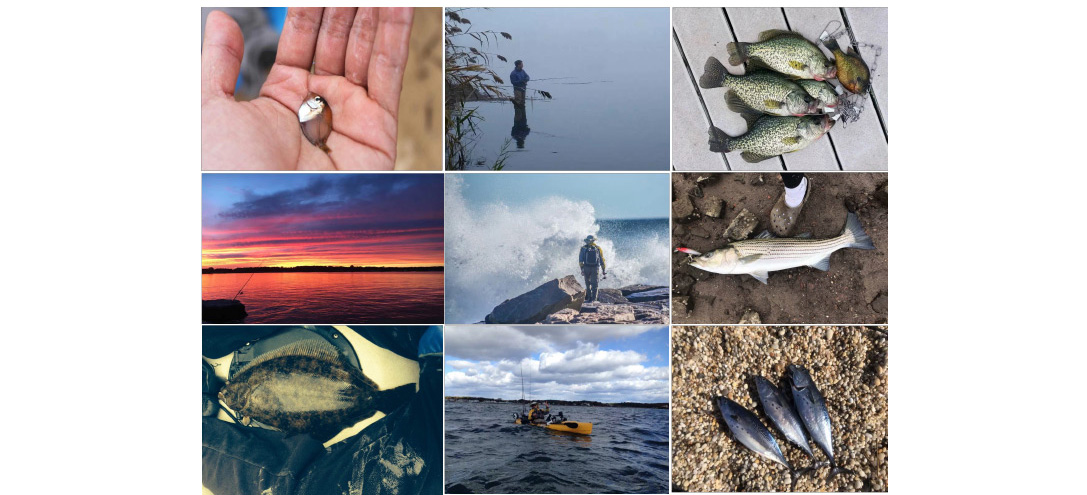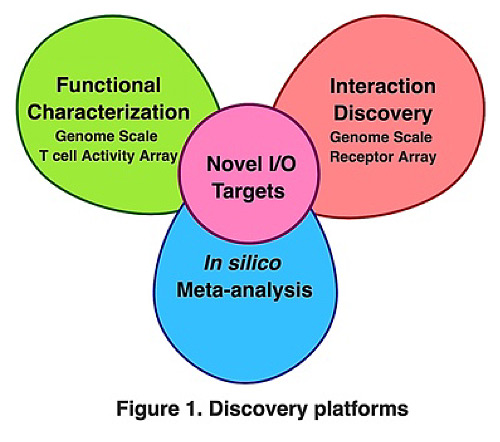Wang Lab: Fishing for Novel Cancer Immunotherapy Targets in the Human Genome!

The advent of immunotherapy has revolutionized cancer therapy. The durable clinical success of PD-1/ PD-L1 blockade illustrates the key concept of targeting immune-evasion mechanisms within the tumor microenvironment to restore tumor-specific immunity. However, given that a substantial subset of patients does not respond to or develop resistance to anti-PD-1/PD-L1 therapy, our major research interest is to discover novel mechanisms that enable immune escape and to utilize these pathways to modulate anti-tumor immunity within the tumor-site for cancer immunotherapy.
 We have previously established several discovery platforms (Figure 1) to systemically discover both novel receptor-ligand interactions and other molecules with immune regulatory activities. In particular, we identified FGL1 as a novel, major immune inhibitory ligand for LAG3 which represents an immune evasion mechanism (Cell, 2019). We also discovered Siglec-15 as an important immune suppressor in PD-L1 null TME (Nature Medicine,2019; CCR,2021). Currently, the clinical trial targeting this pathway in solid cancers is ongoing at NYU and Yale, in addition to other sites. Moreover, We also examined the mechanisms of anti-tumor efficacy versus liver toxicity of agonistic anti-CD137 (4-1BB) therapy and provided new insights for alleviating liver pathology without disruption of anti-tumor immunity (CCR,2019; Oncoimmunology,2018; JI, 2010).
We have previously established several discovery platforms (Figure 1) to systemically discover both novel receptor-ligand interactions and other molecules with immune regulatory activities. In particular, we identified FGL1 as a novel, major immune inhibitory ligand for LAG3 which represents an immune evasion mechanism (Cell, 2019). We also discovered Siglec-15 as an important immune suppressor in PD-L1 null TME (Nature Medicine,2019; CCR,2021). Currently, the clinical trial targeting this pathway in solid cancers is ongoing at NYU and Yale, in addition to other sites. Moreover, We also examined the mechanisms of anti-tumor efficacy versus liver toxicity of agonistic anti-CD137 (4-1BB) therapy and provided new insights for alleviating liver pathology without disruption of anti-tumor immunity (CCR,2019; Oncoimmunology,2018; JI, 2010).
Our laboratory will further study the biology of these pathways, and to develop suitable disease model systems as well as precise biomarkers to facilitate their clinical utilization. In parallel, we will develop more cancer-relevant discovery strategies to identify key pathways responsible for immune evasion within the tumor microenvironment, especially those beyond tumor-T cell interactions. Additionally, we will also design novel therapeutic platforms to combine the benefits of both cellular and protein therapy that fine-tunes immunity in the disease lesion for the optimal control of cancer and autoimmune diseases. In collaboration with basic researchers, clinicians and industry partners, our research programs will define key immune modulatory pathways and contribute to the next-generation immunotherapies for cancer and beyond.
In response to COVID-19 pandemic, we have exploited our experiences in immune modulatory pathways to understand COVID-19 immuno-pathogenesis (JEM, 2020). Moreover, we recently built a novel human myeloid cell receptor discovery approach to identify the specific SARS-CoV-2 virus-myeloid cell interactions that are potentially responsible for virus-induced proinflammatory responses, and can serve as potential targets for the treatment of COVID-19 (Immunity, 2021).
Selected Publications
SARS-CoV-2 Infection and the Immunopathogenesis of COVID-19
- Ting Zhou, Tina Tianjiao Su, Tenny Mudianto, Jun Wang*; Immune asynchrony in COVID-19 pathogenesis and potential immunotherapies. J Exp Med, 5 October 2020; 217 (10): e20200674. (*Corresponding author)
- Qiao Lu, Jia Liu, Shuai Zhao, Maria Florencia Gomez Castro, Maudry Laurent-Rolle, Jianbo Dong…, Peter Cresswell, Yue Liu, Siyuan Ding*, Qi Xie*, Jun Wang*, ACE2 independent SARS-CoV-2 myeloid cell interaction exacerbates inflammatory responses, Immunity, 2021 May 9: S1074-7613(21)00212-0. (*Corresponding author)
- Wei Hu, Yong Zhang, Panyu Fei, Tongtong Zhang, Danmei Yao, Jun Wang*, Zhenhai Li*, Jizhong Lou*, Wei Chen*, Mechanical activation of spike determines SARS-CoV-2 viral infection, Cell Research, 2021. (*Corresponding author)
Identification of Novel Pathways for Cancer Immunotherapy
- Jingwei Sun, Qiao Lu, Miguel F. Sanmamed, Jun Wang*. Siglec-15 as an emerging target for next-generation cancer immunotherapy. Clinical Cancer Research. 2021 Feb 1;27(3):680-688. (*Corresponding author)
- Ting Zhou, William Damsky, Orr-El Weizman, Meaghan K McGeary, K. Patricia Hartmann, Connor E. Rosen, Ruaidhri Jackson, Suzanne Fischer, Jun Wang, Miguel F. Sanmamed, Richard A. Flavell, Marcus W. Bosenberg, Aaron M. Ring, IL-18BP is a secreted immune checkpoint and barrier to effective IL-18 Immunotherapy. Nature, 583, 609–614 (2020).
- Yichen Chen#, Jun Wang#, et al. Pik3ip1 is an immune negative regulator that inhibits T cell responses and anti-tumor immunity. Clinical Cancer Research, 25(20):6180-6194 (2019). (# Co-first authors)
- Jun Wang, Miguel F. Sanmamed, Ila Datar, Tina Tianjiao Su, Lan Ji, Jingwei Sun, Ling Chen, Yusheng Chen, Gefeng Zhu, Weiwei Yin, ..., Mario Sznol, Ignacio Melero, Dario A. A. Vignali, Kurt Schalper, Lieping Chen. Fibrinogen-like Protein 1 is a major immune inhibitory ligand for LAG3. Cell, 176, 334-347 e312 (2019).
- Jun Wang#, Jingwei Sun#, Linda N. Liu, Dallas B. Flies, Xinxin Nie, Maria Toki, Jianping Zhang, Chang Song, Melissa Zarr, ..., Roy S. Herbst, Agedi N. Boto, Miguel F. Sanmamed, Solomon Langermann, David L. Rimm, Lieping Chen. Siglec-15 as an immune suppressor and a potential target for normalization cancer immunotherapy. Nature Medicine, 25, 656-666 (2019) (# Co-first authors)
- Di Liu, Xing Wang, Qian Lu, Jun Wang, Jing Liu, Dianyuan Zhao, Pengbo Cao, Yuandong Tao, Zaopeng Yang, Fuchu He, Li Tang. LSECtin on tumor-associated macrophages advances breast cancer stemness via interaction with BTN3A3. Cell Research, 29(5):365-378 (2019).
- Yuwen Zhu, Sheng Yao, Matthew Augustine, Haiying Xu, Jun Wang, et al. Neuron-specific SALM5 limits inflammation in the CNS via its interaction with HVEM. Science Advances, 2016 Apr 8;2(4): e1500637.
Mechanisms on Immune-related Adverse Events (irAEs) for Cancer Immunotherapy
- Su, Tina Tianjiao, Xiaobin Gao, and Jun Wang*. "A tumor-localized approach to bypass anti-4-1BB immuno- toxicity." Clinical Cancer Research (2019): clincanres-1799. (*Corresponding author)
- Jinhua Zhang#, Kun Song#, Jun Wang#, et al., S100A4 blockage alleviates agonistic anti-CD137 antibody induced liver pathology without disruption of anti-tumor immunity. Oncoimmunology, 2018, Jan 23:7(4). (# Co-first authors)
- Cariad Chester, Miguel F. Sanmamed, Jun Wang, Ignacio Melero. Immunotherapy targeting 4-1BB: mechanistic rationale, clinical results, and future strategies. Blood, 2017 (06), 741041.
- Liang Cheng, Jun Wang, Xiaozhu Li, Qiao Xing, Peishuang Du, Lishan Du, Shengdian Wang. Interleukine-6 Induces Gr-1+CD11b+ Myeloid Cells to Suppress CD8+ T Cell-Mediated Liver Injury in Mice, PLoS One, (Mar 4; 6(3): e17631), 2011.
- Jun Wang, Wenxia Zhao, Liang Cheng, Mingzhou Guo, Dongling Li, Xiaozhu Li, ..., Lieping Chen and Shengdian Wang. CD137-Mediated Pathogenesis from Chronic Hepatitis to Hepatocellular Carcinoma in HBV Transgenic Mice, J Immunol, 185 (12), 2010.
Biomarker Studies for Cancer Immunotherapy
- Miguel Sanmamed, Xinxin Nie,..., Jun Wang, Roy Herbst, Kurt Schapler, Lieping Chen, A burn-out CD8+ T-cell subset expands in the tumour microenvironment limiting cancer immunotherapy, Cancer Discovery, 2021 Mar 3:candisc.0962.2020.
- Ila Datar, Miguel Sanmamed, Jun Wang, Nikita Mani, Franz Villarroel-Espindola, Patrick Ryan, Kristen McEachern, David Jenkins, David L. Rimm, Lieping Chen, Roy S. Herbst and Kurt A. Schalper. Simultaneous measurement and clinical significance of PD-1, LAG-3 and TIM-3 in non-small cell lung cancer (NSCLC). Clinical Cancer Research, 2019: clincanres-4142.
- MF Sanmamed, JL Perez-Gracia, KA Schalper, JP Fusco, A Gonzalez, ..., M Morgado, J Wang, A Bacchiocchi, R Halaban, H Kluger, L Chen, M Sznol, I Melero; Changes in serum interleukin-8 (IL-8) levels reflect and predict response to anti-PD-1 treatment in melanoma and non-small cell lung cancer patients. Annals Oncology 2017 mdx190.
- Yan Luan, Jianqi Ju, Liqun Luo, Zheng Zhang, Jun Wang, Dan-Ming Zhu, Liang Cheng, Shu-Ye Zhang, Lieping Chen, Fu-Sheng Wang, Shengdian Wang. Potential role of soluble B7-H3 in liver immunopathogenesis during chronic HBV infection, Journal of Viral Hepatitis, (Jan; 19:1:23-31), 2012.
Immunological Mechanisms of Human Diseases
- Yalong Wang, Kaixin He, Baifa Sheng B, Xuqiu Lei, ..., Jun Wang , Mingsong Li M, Kaiguang Zhang , Lin Li, Hua Yang, Hua-bing Li, Richard A. Flavell, Shu Zhu. The RNA helicase Dhx15 mediates Wnt-induced antimicrobial protein expression in Paneth cells. PNAS. 2021.
- Yanan Li#, Jun Wang#, Kun Song,..., Zhihai Qin, Jinhua Zhang. S100A4 promotes hepatocellular carcinogenesis by intensifying fibrosis-associated cancer cell stemness. Oncoimmunology. 2020 Jan 1;9(1):1725355. (# Co-first authors)
- Lin Chen, Jie Li, Jinhua Zhang, Liangcheng Dai, Xiaoman Liu, Jun Wang, Zhitao Gao, Hongyan Guo, Rui Wang, ..., Shengdian Wang, Zhihai Qin. S100A4 promotes liver fibrosis via activation of hepatic stellate cells, Journal of Hepatology, (Jan 9;62:1:156-64), 2015.

